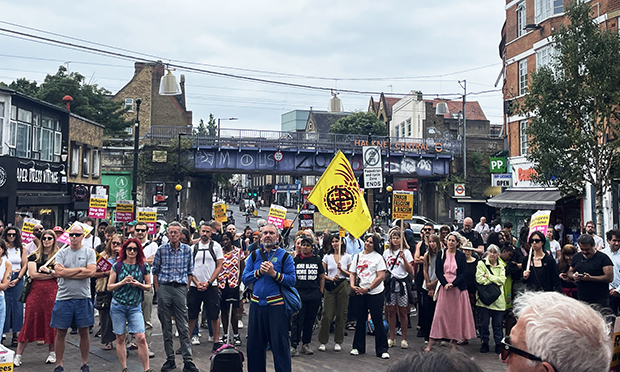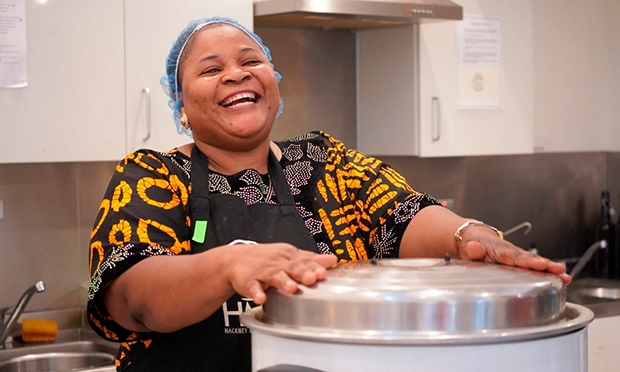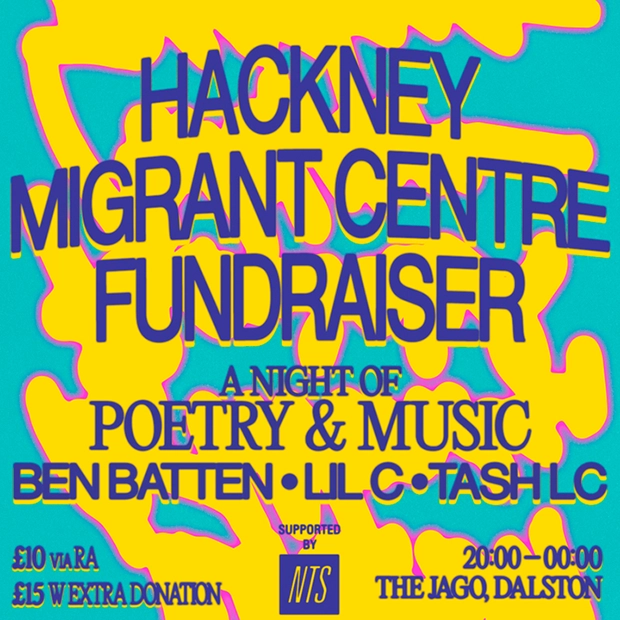Countering the rhetoric: Hackney migrants speak out following a summer of discontent

An anti-racism protest in central Hackney last month. Photograph: Maya Sall / LDRS
Whilst anti-migrant rhetoric sparked violent disorder up and down the country this summer, Hackney was an active and vocal participant in the counter-demonstrations that took place in many towns and cities.
The borough has the sixth most diverse population in the capital, and has seen waves of migration from across the world throughout the 20th century. In 2023, it was recognised as a Borough of Sanctuary.
But the national picture for migrants has never been rosy, and the negative discourse around asylum seekers has dominated British politics for several election cycles. This summer, there was civil unrest as a number of hotels housing asylum seekers were targeted.
For the team at the Hackney Migrant Centre, it was a sobering but unsurprising scene. Yet it was no less heartbreaking, says Augusta Itua, the centre’s chair of trustees.
Hackney Migrant Centre emerged from a hostile environment long before that term entered the political lexicon, she tells me. For those who migrate, getting in is just the beginning, she tells me.
The core mission of the Migrant Centre is to challenge and overcome the barriers to justice which people face throughout their lives due to their legal status as migrants.
“Ten years ago or so there was a really wild immigration landscape, in the sense that there were a lot of bogus lawyers around, which also led to a lot of strengthening of who was able to provide legal advice and regulate the immigration sector.
“Not only do you have people who are quite vulnerable, because of their immigration status, but sometimes they end up in the hands of someone who may have the accreditation or qualification but would charge people £1,000 or £2,000 in fees and still not give the best quality advice,” Augusta says.
Augusta, 31, left Nigeria when she was eight, traveling to Italy to be reunited with her mother. In 2012 she came to the UK so she could start her legal education. Today, she is a children’s rights lawyer.
“I have this very vivid memory of going to Hackney Migrant Centre at the time, because it was incredibly difficult to access immigration advice across London. But this was definitely a place where I knew that if I went out there and I queued, eventually, I would be able to get support for the young people I was supporting.
“Ever since I remembered, there’s always been a provision of a hot meal or food, but also a great will to help some of the most vulnerable in our society.”
The centre’s 60 volunteers are often in a similar position to Augusta, mostly aspiring legal professionals, but not exclusively — with some older volunteers nearing retirement age.

The centre offers a range of support services. Photograph: courtesy Hackney Migrant Centre
From specialist lawyers to caseworkers, the team aims to provide a lifeline for those who can’t get access to the quality legal advice in immigration and housing they need. Their support ranges from helping register for the GP, opening bank accounts, applying for travel cards, and distributing foodbank vouchers. They also link their visitors to mental health provisions and other forms of support.
It is clear that the centre has created a tight-knit community involving both visitors and volunteers, encouraging those seeking advice to take an active role in the organisation.
“What’s unique and remarkable is that quite a few of our volunteers have gone on to get the OISC [immigration advisers] level. It’s that kind of engagement and making sure that volunteers are engaged and up-skilled which means they can remain very much engaged and at the core of our community.”
A circular environment of learning and giving back to the community is crucial, they say, given the precarity of institutions like these.
Refugee Women’s Association, a specialist immigrant advice centre, closed its doors in January this year.
As it stands, voluntary organisations are having to fight against harsh economic conditions. What’s inspiring about Hackney Migrant Centre is also what leaves it vulnerable to that most ancient of challenges — hate.
Despite spending many years immersed in a stark awareness of the layers of racism that migrants like herself face, Augusta was not prepared for the burst of racist, anti-immigrant energy unleashed this August.
“As a trustee of Hackney Migrant Centre, I felt a moral obligation to participate in the counter-protest and stand in solidarity with migrants and staff. I was warned that attending might be unsafe for me, given that I could be easily identifiable.
“But I refused to accept a reality where it would be unsafe for me to walk along what is possibly one of the most diverse miles in the UK, from Dalston Junction station to Stoke Newington.
“I joined the counter-protest organised by Hackney Stand Up to Racism outside The Old Fire Station, next to Masjid At-Tarbiyah mosque.
“I was humbled by the absence of disorder and the solidarity shown by the community, which was instrumental in helping me regain a sense of safety and inner peace after the heightened anxiety levels generated by the threats, particularly for people of colour and those of Muslim heritage.”

The centre is hosting a fundraiser in Dalston on 21 September
Other visitors shared the sense of terror and conflict. Abass, from Nigeria, said he almost felt like he was in a movie, and that the thugs would find a way to get him.
“I felt like an unwanted child with no-one to save me, bringing back terrifying memories. It also brought the awareness that I was black, even though I was raised by British law and history.”
Abass arrived in the UK at 16, always dreamed of studying politics and law at university. But despite excelling academically and securing a university place, he was left in despair after his immigration status prevented him from pursuing higher education.
In his search for help he found the Hackney Migrant Centre, who supported him but also encouraged him to volunteer with them. This instilled a sense of community in him that he was missing, helping him find purpose and resilience amid his stalled educational development. Now, at 19, he is set to study law and politics thanks to the support from the Centre.
Trustees, volunteers and Hackney Migrant Centre staff each recall the impact of the recent civil disorder.
CEO Becky Moore said visitors told the centre they were “scared to leave their homes and terrified for their children’s safety when on public transport or walking home.
“Many were calling their families urging them to stay inside and we were having to tell traumatised and vulnerable visitors to take safety precautions and be additionally vigilant.”
Despite the counter-demonstrations where Mayor Caroline Woodley called on protestors to “stand with Hackney Migrant Centre, with the synagogues, with the mosques”, the centre’s services were forced to temporarily shut, and a community event for 150 people cancelled. Their offices remained closed for a week.
This appears to be what centre’s dedicated organisers find most hard to bear.
“While solidarity in the face of hate is powerful, it’s hard to escape the fact that the far-right succeeded in bringing crucial support services to a standstill and pushing migrant communities behind closed doors,” Moore said.
The clear threat to the wellbeing of countless people underlines how vital are places like the Hackney Migrant Centre.
This reminder, however, comes as the organisation launches a crowdfunding bid to keep its doors open.
To ‘sustain its vital services’, the centre is urgently appealing to raise £100,000 by matching donations up to £250.
This means that donations up to £250 will be equally matched, and therefore doubling their impact.
The crowdfunder, which ends on 1 October, has already raised over £65,000.
The centre is also hosting a fundraiser at The Jago in Dalston on 21 September.
Update: this article was amended at 2.30pm on 18 September 2024. It originally stated that volunteers refer to themselves as visitors, but volunteers and visitors are in fact separate.
